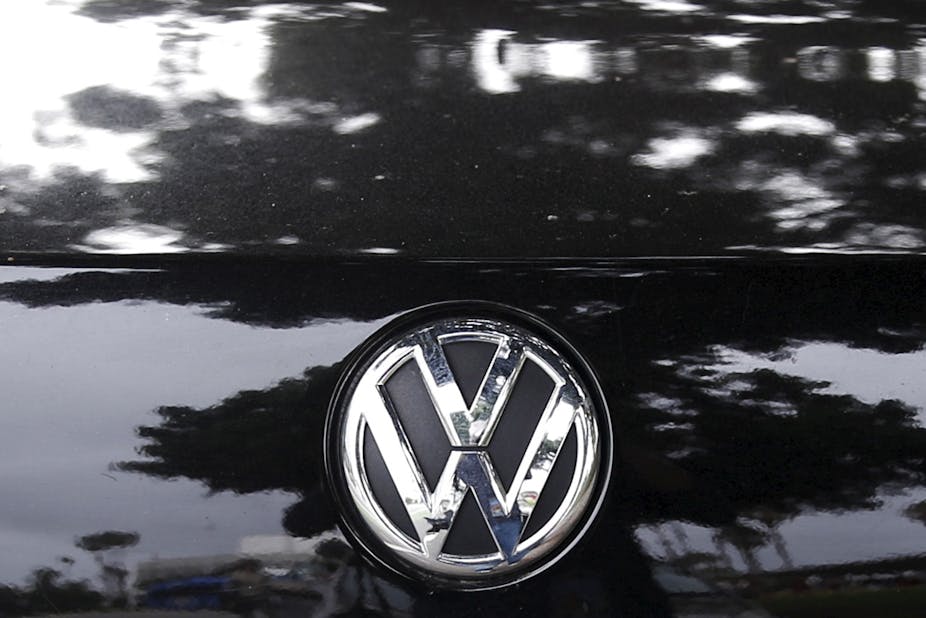If we cannot figure out how to properly test car emissions, we might as well give up on regulating forests, factories or garbage dumps. After all, cars ought to be ideal targets for environmental regulators. They’re largely standardised – most look and act more or less the same – and they’re produced by the thousand or million. Test one Volkswagen Polo and you should have tested them all. In theory.
Yet it hasn’t worked like that in practice. A month after the VW scandal broke most eyes are still on the German carmaker and its plunging shares, the desk clearing in management, and its hectic efforts at retrofitting. Fewer people are reflecting on what the scandal means for our system of environmental governance. This is missing the bigger story.
Bypassing the system
In a way, the emissions scandal shows there is a difference between clever cheating and dumb cheating. By its own admission, Volkswagen tampered with the car’s software in order to get good emission figures in testing mode. This is dumb cheating, especially if you get caught: it’s clearly against the rules.
But what if car manufacturers and regulators agree on a set of rules for testing that could deliver good figures for fuel efficiency? It is widely known that cars achieve notably better mileage per gallon on the test stand than in everyday practice. In fact, the difference has increased dramatically in recent years: according to the International Council on Clean Transportation, the NGO whose emission tests led to the fall of Volkswagen, the gap between official and actual carbon dioxide emissions in new European cars grew from 8% in 2001 to 40% in 2014. Such a divergence is clearly misleading customers and the general public, but it’s not illegal. That’s smart cheating.

Standard setting on environmental matters is a murky area that few people bother to enter. Scientific results may provide some guidance, but there is always room for interpretation, and many rules and regulations are negotiated behind closed doors. The botched numbers for fuel efficiency are a good occasion to take a closer look. Is this the power of the automobile industry at work? Is this about lazy bureaucrats whose principal aim in life is to be out of the office at five? Or maybe it is about a third party such as the facilities that do the actual testing?
Testing times
Negotiations over test procedures are inherently boring, but they matter a lot. If the upcoming Paris climate summit finally seals a deal on global warming, it will all be about numbers, and there will be endless worries if we can no longer trust them. Thanks to standardised mass production, cars should be one relatively simple part of a global system of emissions regulations. If we cannot secure reliable numbers here, we are in trouble when it comes to forests, soils, and other parts of the biosphere.
The trouble with test procedures is particularly disturbing since there really is not much room for debate. It is obvious that numbers should be accurate and that tests should reflect the real world. It’s also clear that an independent authority should certify the rules. The Volkswagen scandal indicates the industrial economies of the West cannot sustain that kind of independence anymore.
When today’s framework of environmental governance evolved in the 1970s, the general idea was that environmental ministries and other government bodies would serve as a counterweight to the vested interest. Now it turns out that the presumed watchdog is curiously reluctant to bark. A lot has been written over the last month about the loss of trust, but it’s really a matter of institutions rather than morals. Maybe we need a watchdog for the watchdog?
Volkswagen has shown the huge toll of dumb cheating, but the scandal also suggests the risk of getting caught was not significant. The story only broke because of a study that worked with a grand total of three cars, two of which happened to be Volkswagens. A cash-strapped NGO could not afford to cast a wider net, and it was a matter of luck that it made the right choices. No system of environmental governance can rely on these kinds of coincidences.
Volkswagen’s managers are red-faced, but that will be a temporary thing. They will either change their corporate culture, or there will be no more Volkswagen managers. Whether regulators are red-faced is anyone’s guess, but they certainly should be embarrassed. The question is whether anyone bothers to look them in the face.

